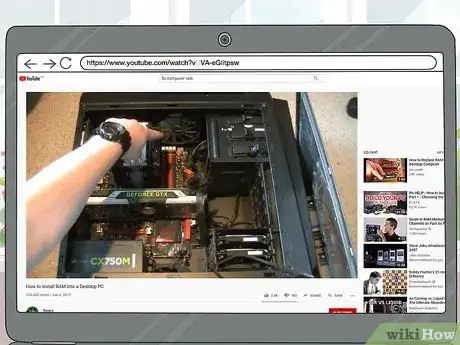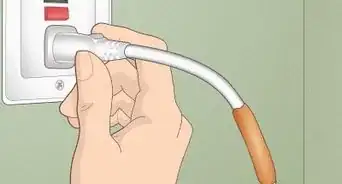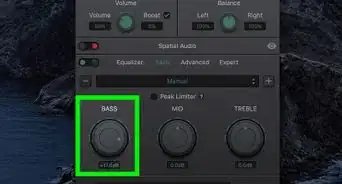This article was co-authored by Marvin Woo. Marvin Woo is a licensed electrician and the Owner of Woo's Electrical & Appliance based in East O’ahu. With over two decades of experience, he specializes in troubleshooting issues and maintaining residential electrical systems. Marvin is both licensed and insured to complete electrical work in the state of Hawaii.
There are 12 references cited in this article, which can be found at the bottom of the page.
This article has been viewed 31,783 times.
Knowing how to repair electronics is a useful skill, whether you plan on making a career out of it or just want to be able to fix your own devices when they're on the fritz. You have several options available to you if you’re interested in studying electronics repair in a formal capacity, including college courses, certification programs, and trade apprenticeships. However, it’s also possible to teach yourself the fundamentals at home using helpful resources like textbooks, magazines, and video tutorials, along with some good old-fashioned tinkering.
Steps
Teaching Yourself
-
1Tinker with different devices for a firsthand look at electronics in action. There’s no better way to master a technical craft than to get your hands dirty. Gather up any old or unused electronics you have lying around and practice taking them apart and putting them back together. This will give a chance to examine their inner workings and make sense of the complicated relationships that exist between them.[1]
- As your knowledge grows, you can play around with modifying, upgrading, and switching out components, which will serve as a valuable introduction to building your own electronics from scratch.
- Think of figuring out how things function as solving a puzzle. The best electronics specialists tend to be people who excel at problem-solving.[2]
-
2Read electronics textbooks to absorb the fundamentals in your spare time. Scour new and used bookstores for textbooks that deal specifically with the diagnostic and repair aspects of electronics. One of the major advantages of textbooks is that they present a thorough overview of important ideas. Most textbooks are also laid out in a way that makes it easy for you to follow along at your own pace.[3]
- Start with books on general concepts and theories before proceeding to ones that cover more specific projects and procedures.
- Other non-textbook titles like Getting Started in Electronics by Forrest M. Mims III and The Art of Electronics by Paul Horowitz and Winfield Hill also come highly recommended by electronics enthusiasts.[4]
- Your local library can be a great resource for finding books about electronics.[5]
Tip: Make sure the textbooks you buy are no more than a few years old. Technology is always evolving and advancing, so you’re less likely to get a complete picture from outdated books.
Advertisement -
3Subscribe to electronics magazines to stay informed about the field. Nuts and Volts, Electronics for You, and Elektor are all popular publications that you can find at your public library or any major book retailer. This sort of literature often contains the same kind of information you would find in electronics textbooks, only in a more digestible, reader-friendly format.[6]
- Within the pages of these magazines, you’ll also find special interest topics and up-close looks at emerging technologies and innovative industry practices.
- Some of the publications mentioned here are also available online in a digital format.[7]
-
4Watch video tutorials if you’re more of a visual learner. Hit up sites like YouTube and DailyMotion and search for videos on how to work with various components, assemblies, and products. This is one of the best ways to pick up a practical understanding quickly, as you’ll have the opportunity to receive detailed explanations and walkthroughs from experienced technicians while watching them carry out tasks in real time.[8]
- Only watch videos uploaded by users who have a polished, professional presentation. The information you get from people’s personal channels may not always be trustworthy.
- The internet is a great resource for learning about electronics repair.[9]
-
5Get familiar with the tools of the trade to prepare to tackle your own projects. As an electronics technician, you’ll need to know your way around a few universal implements and instruments, such as soldering irons, multimeters, oscilloscopes, breadboards, and wire strippers. Pore over tech manuals and video tutorials to get a sense of how these items work and what they’re used for. This sort of technical know-how will come in handy once you’re ready to apply what you’ve learned.[10]
- You can purchase most of these tools online, or from stores that sell electronics and laboratory supplies.
- Exercise caution when handling items like soldering irons, live wires, and power supplies. While electronics isn’t an inherently dangerous field, some pieces of equipment do come with the risk of burns or electrocution if handled incorrectly.
Getting an Education
-
1Go to school to study electronics in an academic setting. Enroll in a university, community college, or tech school in your area that’s known for having a strong electronics program. There, you’ll have the freedom to either sign up for specific classes that interest you. If you’re serious about pursuing your education, you might also consider completing a 2-year associate or 4-year bachelor degree in electronics technology.[11]
- These days, more and more colleges are making electronics repair part of their curriculum, so you’re almost guaranteed to find a school that suits your needs.
- Electrical engineering is another field of study that can provide you with the foundational knowledge and skills required to build and repair electronic devices.[12]
-
2Obtain an electronics technician certification as an alternative to school. If you don’t have the time, money, or desire to go to college, a more expedient option is to look into a third-party certificate program. There are many such certifications to choose from, most of which can be earned by simply completing a few short modules or courses and passing an exam. Run a quick search for “electronics repair certification” plus the name of your town or city to find a program near you.
- Narrow down your search results to programs offered by reputable schools, trade academies, or tech companies. It’s not always easy to tell what you’ll be getting, so it’s best to stick with certifications issued by accredited bodies and organizations with national recognition.
- Certifications are available for a wide variety of skills, systems, and vocations. Choose one that conforms most closely to your individual interests.
- Keep in mind that certifications may vary from state to state. Check-in with your local licensing offices to be sure.[13]
Tip: It’s even possible to earn certain certifications online, which could be more convenient for you if you’re attempting to learn how to repair electronics in your spare time.
-
3Sign up for an online course to get an accelerated primer on electronics. Many colleges and tech schools offer online courses for electronics-related subjects to non-students. If you’re looking for a less costly alternative, you can also take advantage of video classes and other web-based resources from independent tech groups for free or cheap. Prices for online courses range from $0-20 for free-study modules created by third-party developers to $1,000 and up for complete university programs.
- In addition to basic electronics technology, you might also benefit from courses in subjects like circuit analysis, semiconductor devices, and digital electronics.
- Intro-level courses will acquaint you with key concepts like current, voltage, resistance, amplification, resonance, and magnetism, as well as common components such as wires, circuits, transformers, capacitors, and inductors.[14]
-
4Apply for an apprenticeship with a electrician for a more hands-on approach. If you’re a high school graduate and have some prior knowledge of electronics, you might be eligible for a position as an apprentice or assistant to an electrician service operating in your neck of the woods. Electricians must be well-versed in practical electronics principles, and are often experts when it comes to troubleshooting common issues.[15]
- Browse listings for apprenticeships and assistant positions online. Be prepared to submit an updated resume, and keep in mind that you may be expected to have your own reliable means of transportation in order to get to and from job sites.
- During your apprenticeship, you’ll encounter different wiring configurations, lighting fixtures, power and grounding systems, and other everyday components.[16]
References
- ↑ https://hackaday.com/2017/09/14/whats-the-best-way-to-learn-electronics/
- ↑ https://careertrend.com/how-5880288-learn-electronic-repair.html
- ↑ https://careertrend.com/how-5880288-learn-electronic-repair.html
- ↑ https://www.electronicshub.org/electronics-books-beginners/
- ↑ Marvin Woo. Licensed Electrician. Expert Interview. 1 December 2021.
- ↑ https://blog.feedspot.com/electronics_magazines/
- ↑ https://www.techiestuffs.com/best-magazines-for-electronics-hobbyist-and-professionals/
- ↑ https://blog.feedspot.com/electronics_youtube_channels/
- ↑ Marvin Woo. Licensed Electrician. Expert Interview. 1 December 2021.
- ↑ https://careertrend.com/how-5880288-learn-electronic-repair.html
- ↑ https://careertrend.com/how-5880288-learn-electronic-repair.html
- ↑ https://www.livescience.com/47571-electrical-engineering.html
- ↑ Marvin Woo. Licensed Electrician. Expert Interview. 1 December 2021.
- ↑ https://www.elprocus.com/major-electronic-components/
- ↑ https://www.electricianschooledu.org/apprentice/
- ↑ https://electricianapprenticehq.com/what-is-an-electrician-apprentice/
- ↑ https://www.payscale.com/research/US/Job=Electronics_Technician/Hourly_Rate





































































